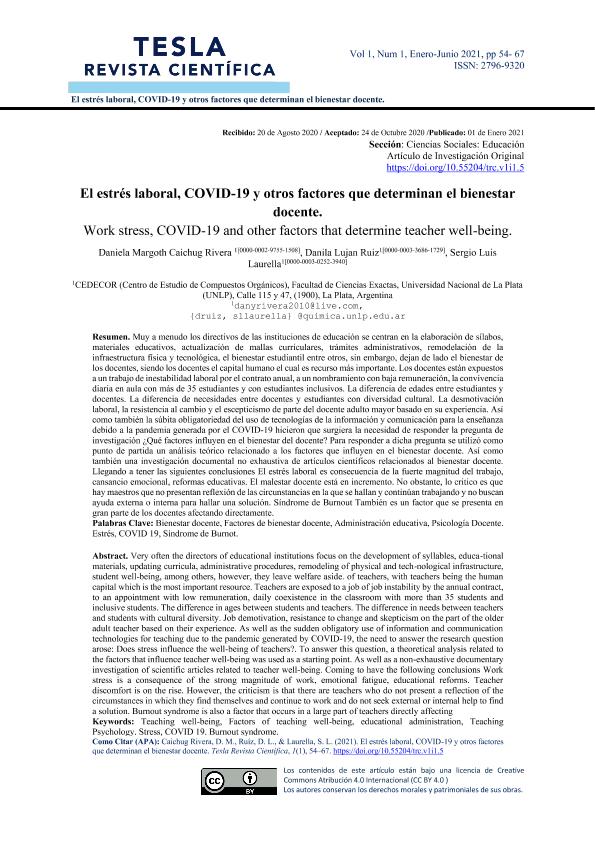Mostrar el registro sencillo del ítem
dc.contributor.author
Caichug Rivera, Daniela Margoth

dc.contributor.author
Ruiz, Danila Luján

dc.contributor.author
Laurella, Sergio Luis

dc.date.available
2023-08-28T12:54:18Z
dc.date.issued
2021-06
dc.identifier.citation
Caichug Rivera, Daniela Margoth; Ruiz, Danila Luján; Laurella, Sergio Luis; El estrés laboral, COVID-19 y otros factores que determinan el bienestar docente; Puerto Madero Editorial Académica; Tesla Revista Científica; 1; 1; 6-2021; 54-67
dc.identifier.issn
2796-9320
dc.identifier.uri
http://hdl.handle.net/11336/209475
dc.description.abstract
Muy a menudo los directivos de las instituciones de educación se centran en la elaboración de sílabos, materiales educativos, actualización de mallas curriculares, trámites administrativos, remodelación de la infraestructura física y tecnológica, el bienestar estudiantil entre otros, sin embargo, dejan de lado el bienestar de los docentes, siendo los docentes el capital humano el cual es recurso más importante. Los docentes están expuestos a un trabajo de inestabilidad laboral por el contrato anual, a un nombramiento con baja remuneración, la convivencia diaria en aula con más de 35 estudiantes y con estudiantes inclusivos. La diferencia de edades entre estudiantes y docentes. La diferencia de necesidades entre docentes y estudiantes con diversidad cultural. La desmotivación laboral, la resistencia al cambio y el escepticismo de parte del docente adulto mayor basado en su experiencia. Así como también la súbita obligatoriedad del uso de tecnologías de la información y comunicación para la enseñanza debido a la pandemia generada por el COVID-19 hicieron que surgiera la necesidad de responder la pregunta de investigación ¿Qué factores influyen en el bienestar del docente? Para responder a dicha pregunta se utilizó como punto de partida un análisis teórico relacionado a los factores que influyen en el bienestar docente. Así como también una investigación documental no exhaustiva de artículos científicos relacionados al bienestar docente. Llegando a tener las siguientes conclusiones El estrés laboral es consecuencia de la fuerte magnitud del trabajo, cansancio emocional, reformas educativas. El malestar docente está en incremento. No obstante, lo critico es que hay maestros que no presentan reflexión de las circunstancias en la que se hallan y continúan trabajando y no buscan ayuda externa o interna para hallar una solución. Síndrome de Burnout También es un factor que se presenta en gran parte de los docentes afectando directamente.
dc.description.abstract
Very often the directors of educational institutions focus on the development of syllables, educa-tional materials, updating curricula, administrative procedures, remodeling of physical and tech-nological infrastructure, student well-being, among others, however, they leave welfare aside. of teachers, with teachers being the human capital which is the most important resource. Teachers are exposed to a job of job instability by the annual contract, to an appointment with low remuneration, daily coexistence in the classroom with more than 35 students and inclusive students. The difference in ages between students and teachers. The difference in needs between teachers and students with cultural diversity. Job demotivation, resistance to change and skepticism on the part of the older adult teacher based on their experience. As well as the sudden obligatory use of information and communication technologies for teaching due to the pandemic generated by COVID-19, the need to answer the research question arose: Does stress influence the well-being of teachers?. To answer this question, a theoretical analysis related to the factors that influence teacher well-being was used as a starting point. As well as a non-exhaustive documentary investigation of scientific articles related to teacher well-being. Coming to have the following conclusions Work stress is a consequence of the strong magnitude of work, emotional fatigue, educational reforms. Teacher discomfort is on the rise. However, the criticism is that there are teachers who do not present a reflection of the circumstances in which they find themselves and continue to work and do not seek external or internal help to find a solution. Burnout syndrome is also a factor that occurs in a large part of teachers directly affecting
dc.format
application/pdf
dc.language.iso
spa
dc.publisher
Puerto Madero Editorial Académica
dc.rights
info:eu-repo/semantics/openAccess
dc.rights.uri
https://creativecommons.org/licenses/by/2.5/ar/
dc.subject
BIENESTAR DOCENTE
dc.subject
FACTORES DE BIENESTAR DOCENTE
dc.subject
ESTRÉS
dc.subject
COVID-19
dc.subject.classification
Otras Ciencias de la Educación

dc.subject.classification
Ciencias de la Educación

dc.subject.classification
CIENCIAS SOCIALES

dc.title
El estrés laboral, COVID-19 y otros factores que determinan el bienestar docente
dc.title
Work stress, COVID-19 and other factors that determine teacher well-being
dc.type
info:eu-repo/semantics/article
dc.type
info:ar-repo/semantics/artículo
dc.type
info:eu-repo/semantics/publishedVersion
dc.date.updated
2023-08-15T23:07:29Z
dc.journal.volume
1
dc.journal.number
1
dc.journal.pagination
54-67
dc.journal.pais
Argentina

dc.journal.ciudad
La Plata
dc.description.fil
Fil: Caichug Rivera, Daniela Margoth. Consejo Nacional de Investigaciones Científicas y Técnicas. Centro Científico Tecnológico Conicet - La Plata; Argentina. Universidad Nacional de La Plata. Facultad de Ciencias Exactas. Departamento de Química. Laboratorio de Estudio de Compuestos Orgánicos; Argentina
dc.description.fil
Fil: Ruiz, Danila Luján. Consejo Nacional de Investigaciones Científicas y Técnicas. Centro Científico Tecnológico Conicet - La Plata; Argentina. Universidad Nacional de La Plata. Facultad de Ciencias Exactas. Departamento de Química. Laboratorio de Estudio de Compuestos Orgánicos; Argentina
dc.description.fil
Fil: Laurella, Sergio Luis. Consejo Nacional de Investigaciones Científicas y Técnicas. Centro Científico Tecnológico Conicet - La Plata; Argentina. Universidad Nacional de La Plata. Facultad de Ciencias Exactas. Departamento de Química. Laboratorio de Estudio de Compuestos Orgánicos; Argentina
dc.journal.title
Tesla Revista Científica
dc.relation.alternativeid
info:eu-repo/semantics/altIdentifier/url/https://tesla.puertomaderoeditorial.com.ar/index.php/tesla/article/view/5
Archivos asociados
